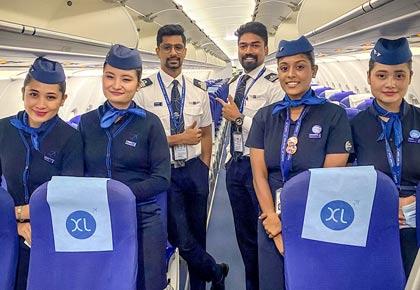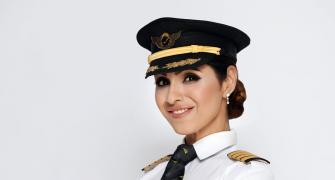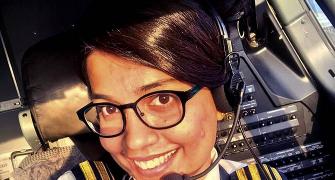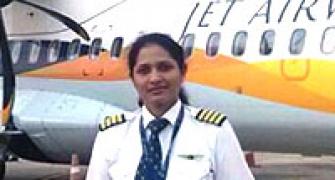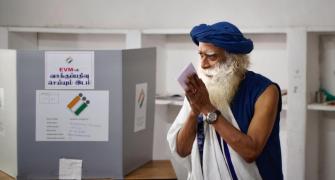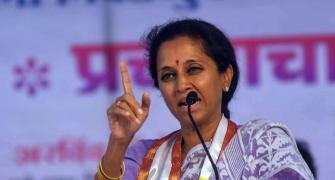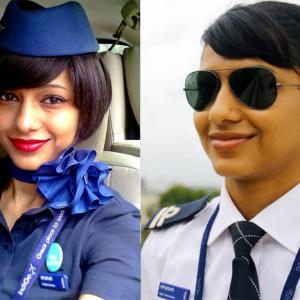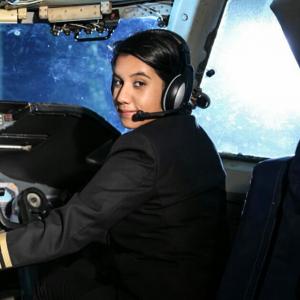Hundreds of pilots are staring at a long wait to get the job of their dreams after completing the course, the cost of which runs to Rs 1 crore.

Kumar Ashish felt elated when he was selected for IndiGo's cadet pilot programme.
Run by India's largest airline, the programme partners flying training organisations in India and overseas and is one of the most trusted by aspirant pilots.
One of the attractions of the programme was the airline's rapid expansion plans. A fresh graduate like Ashish believed he was assured placement with the airline after completing his ground training and navigation and flying training. But his timing was inopportune.
"I enrolled for the course in 2019 with one of IndiGo's certified organisations. At that time the airline was conducting almost four recruitment drives per month. I was waiting to finish my training to enter a cockpit. But by the time my training was over, the pandemic had grounded airlines and I am still waiting for an appointment letter," Ashish said.
Like him, hundreds of pilots in the country are staring at a long wait to get the job of their dreams, and many like Ashish are in a fix after completing the course, the cost of which runs to Rs 1 crore (Rs 10 million). Aircraft induction has almost stalled for Indian carriers.
At the beginning of 2020, India had 695 aircraft. By the end of April this year, the total count stood at around 710 -- an increase of just 15 planes.
IndiGo has paused plans until the end of 2023 as it recoups from the impact of COVID-19, and its new aircraft inductions are mostly for replacements.
Meanwhile, Air India under the Tata group has not yet started its expansion, and financially stressed airlines such as SpiceJet and Go First are not adding to their fleet.
Airline managements have also used the current state to reduce pilot salaries -- one of the biggest cost overheads for airlines. A recruiter for an airline said that pre-pandemic, the supply of pilots lagged demand; today, the situation has supply chasing demand.
"There was a time when IndiGo was inducting one aircraft every week and paying pilots to surrender their leave. But now, there are surplus pilots. So, airlines are taking the opportunity to rationalise salaries, which were above normal industry average before," he said.
Though the pandemic has led to concerns about pilots' job prospects, flight schools believe that the situation will change soon and the choice of piloting as a profession will remain as lucrative as ever. Accordingly, they are investing heavily in building new facilities and buying new aircraft. They have their reasons.
It is anticipated that the aviation industry will be back to full capacity by 2024. So an aspiring pilot who joins a flight school now will be ready only by 2024 as it takes at least two years to complete training and get rated on a specific aircraft (called type training).
Hemanth D P, CEO of Asia Pacific Flight Training Academy, who also has experience of running an airport as chief commercial officer of Hyderabad airport, said upswings and downswings are normal for any aviation industry. He predicted that the current cohort of available trained pilots will be absorbed by airlines by the middle of 2023 when hiring will resume.
"Before the pandemic, as operator of one of the busiest airports in India, I was surprised to get requests from airlines for a parking stand at 4 pm. That means they were losing almost half of the day's operations. When I enquired why, the airlines pointed to the pilot shortage," Hemanth recalls.
"As domestic operations get back to normalcy and international operations pick up, we will again see normalcy restoring by the middle of 2023," he said, pointing out that the fundamentals of the market have not changed.
"India's middle class is growing while only 10-12 per cent of Indians have flown. There will be a steady conversion of passengers from train to planes due to which the market will grow and airlines will induct more aircraft which means we will require more pilots," Hemanth adds.
The academy, which is based out of Hyderabad airport, has an agreement with the Airport Authority of India for establishing a flight training organisation on design, build, operate, maintain and transfer (DBOMT) basis at Kalburgi airport, Karnataka, for 25 years.
"The country can currently churn out 500 pilots per year. We need to expand capacity so that students who go abroad can be trained in India," says Hemanth.
Chimes Aviation Academy, which is a partner for IndiGo's cadet pilot programme course, is also not worried by the current downturn and is instead investing more on building more facilities.
"Tell me one single industry that hired in the last two years. Absolutely no one. But is the downturn permanent? No," says Y N Sharma, CEO, Chimes Aviation Academy.
Even if the current fleet of Indian airlines remains static, Sharma says the industry will require 800 pilots per year as people will retire, become medically unfit or migrate to West Asia for higher salaries.
Chimes, which currently operates out of Dhana in Madhya Pradesh, has taken up two new airfields at Neemuch and Shivpuri, also in MP. The academy is also adding 20 new aircraft to its existing fleet.
The optimism of the flight school operators is shared by the airlines. The head of recruiting quoted above said that West Asian airlines such as Emirates, Qatar, and Air Arabia have already started hiring and are trying to poach Indian pilots.
In addition to that, two new airlines -- Akasa Air and Jet Airways -- are looking to start operations. Akasa has significant expansion plans of adding 75 aircraft in four to five years.
"The future is bright for Indian aviation and we realise that," says Sharma. "That is why we have put our money where the mouth is."
